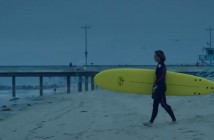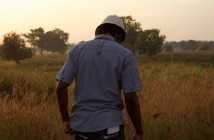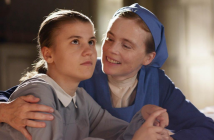
The Phone Call (dirs. Mat Kirkby & James Lucas)
Editor’s Notes: The 2015 Oscar nominees for Best Live Action Short Film and Best Animated Short Film are currently screening at TIFF Bell Lightbox. For more information visit http://tiff.net and follow TIFF on Twitter at @TIFF_NET.
If you’re liable to lose faith in the movies in these early months of the year, when studios use theaters as their dumping grounds for whatever doesn’t fit elsewhere (largely for quality reasons, though there are usually some hidden gems that just belie marketing), seeing the Oscar nominated short films should disabuse you of any ill-formed fears about a barren cinematic landscape. Not all of the shorts are excellent, but they all show a sense of experiment and verve that will remind you of the limitless possibilities of the form.
The live action shorts are an incredibly strong crop this year, with a variety of form, style, and purpose than makes them an excellent showcase of cinematic diversity. “Aya” is a short film that feels perfectly formed and executed at its length, but is so wholly engrossing and entertaining I’d have been happy if it was feature length. Aya (Sarah Adler) waits at an airport, having a phone conversation that leaves her unhappy. A limo driver has to move his car and asks her to hold his greeting sign. Thomas (Ulrich Thomsen) then arrives, and Aya impulsively does not correct his assumption that she is his driver. As they drive, she tries to figure him out, and slowly reveals that she is not who he thinks. After that, their walls slowly break down, until they are not strangers awkwardly enduring a ride from the airport, but two lonely people yearning to connect. This is a quiet, bittersweet, lovely little short that hums with the possibility of this new connection, but also recognizes how tenuous such a chance encounter might be. “Aya” is a fantastic showcase for Adler and Thomsen, and for directors Mihal Brezis and Oded Binnum, a truly masterful use of time and tone that represents one of the heights of what a short can achieve.

Boogaloo and Graham (dirs. Michael Lennox & Ronan Blaney)
“Boogaloo and Graham,” a vignette about two young boys growing up in Belfast during The Troubles who are given pet chickens to whom they become attached, is a cute and funny little diversion that functions as a quick punch. There’s style to it, as when the boys cavort around Belfast, beaming with pride and charged with youthful exuberance at their new pets, but it mostly exists to land a few laughs and an emotional stinger at the end that lends the whole thing more depth than it might need. Still, “Boogaloo and Graham” is sweet and funny, and there’s a sense it has no desire to be anything more.
“Butter Lamp” is simple but deeply evocative, an exploration of artifice and the deeply human desire to experience and memorialize. A Chinese photographer takes pictures of a variety of people, set against a series of changing backdrops. What results is a varied exploration of humanity, a layered ode to the varied complexity of humanity. “Butter lamp” is quintessentially a short, intended from the first to hint at all of the depth and mystery of humankind, but to remain just a hint, a moment’s contemplation of things a lifetime would not be able to fully unravel.
“Parvaneh” focuses on two young girls from different worlds and in different situations, whose lives intersect and who form a connection that reaffirms their faith in the world. In lesser hands, “Parveneh” could by cloying, but Talkhon Hamzavi and Stefan Eichenberger approach the material so matter-of-factly, they eschew what could be melodrama in favor of something that feels more grounded and true. It’s quiet optimism in the face of a sea of oppression that could easily lead to melodrama, affecting for the way it quietly believes in our power to connect, to understand, and to trump our lesser instincts and find our better selves.
“The Phone Call” takes two amazing actors—Sally Hawkins and Jim Broadbent—and basically asks them to carry a maudlin story with a cloying resolution home. That they manage it for as long as they do is a testament to both performers (Broadbent, who is never seen on screen, especially), but this is a story that falters in its resolution, a lesser effort compared to the rest of the live action category.

A Single Life (dirs. Marieke Blaauw, Joris Oprins & Job Roggeveen)
Turning to the animated films, “A Single Life” is a brief, bleak, blisteringly funny look at our tendency to want to skip through our lives, to find the milestones or peak around a corner. A woman is delivered a 45 record, and when she moves the needle forward, the years begin to tick away. It’s a clever concept that wisely contains itself to a brief running time, where its impact is at its height, and its punch line comes not a moment too soon.
“Feast” is an adorable Disney short about a very hungry dog who bonds with his master only to sacrifice his culinary delights for a chance at his owner’s happiness. More intended to provide a few “awws” before Big Hero 6 than to be completely satisfying on its own, this is still a cute little film about an adorable puppy who loves to eat and loves his best friend.
“Me and My Moulton” is a beautifully understated memoir of growing up a middle child in an avant garde family, striving to be normal or to understand the brand of abnormal expected of her. Writer/director Torill Kove renders the story in whimsical colors and simple yet evocative art, which underscores the layered narration that accompanies it.
“The Bigger Picture” is the most tactile of the lot, giving added dimension to its story of squabbling brothers trying, in their own ways, to care for their ailing mother. The images create a psychological reality if not a physical one, as the over-burdened, under-appreciated brother engages in flights of fancy that feel like they might explode from the screen entirely. “The Bigger Picture” makes you feel both emotionally and nearly literally.
“The Dam Keeper” is a melancholy tale whose often smudgy images reflect the muddled, woeful perspective of its titular main character, a misfit pig dealing with the blows of bullying and betrayal. Loneliness is a way of life as “The Dam Keeper” begins, but the short seems confident it doesn’t have to stay that way. There is hope, in the end, that connections will be made, friendships forged, and the darkness kept at bay.



